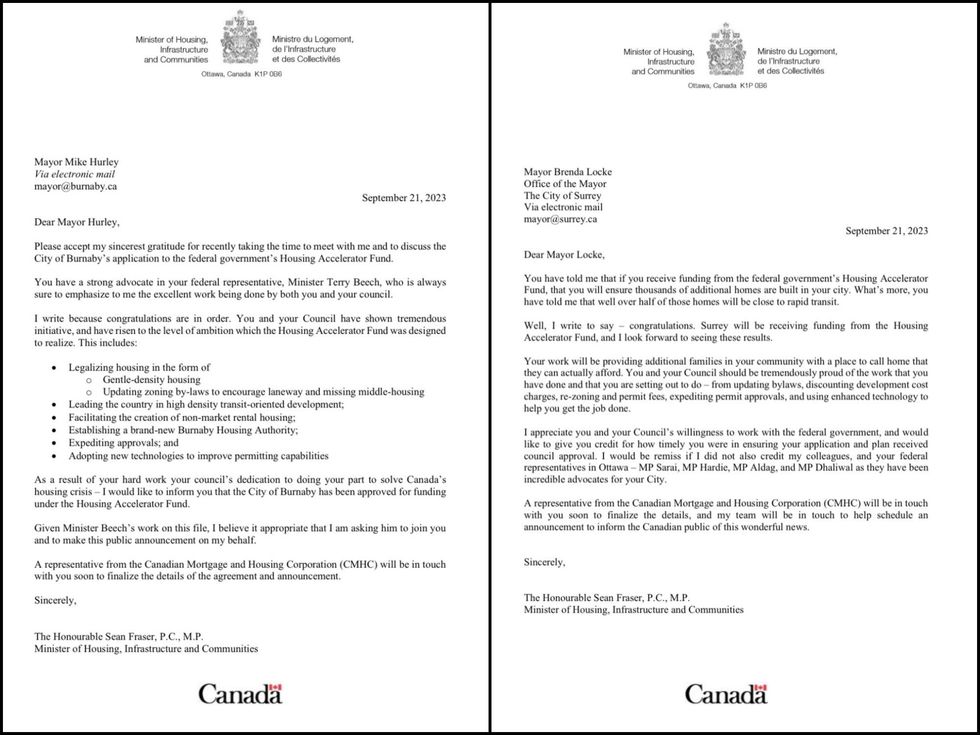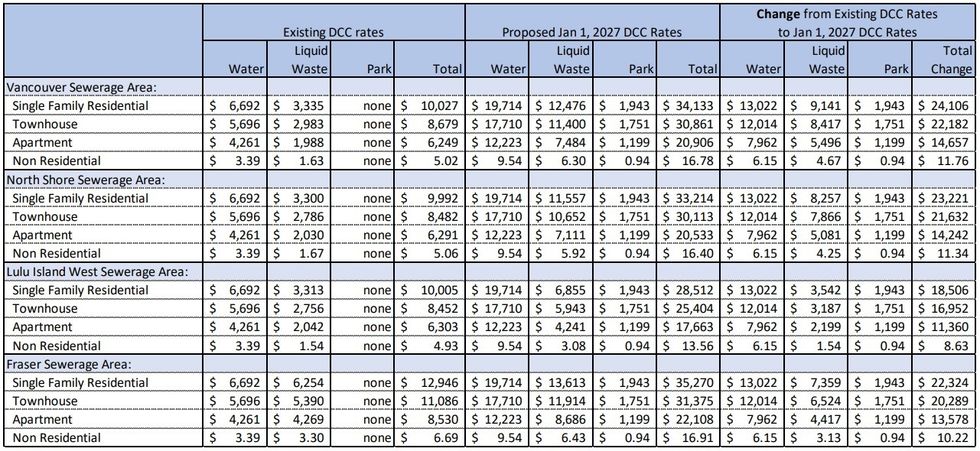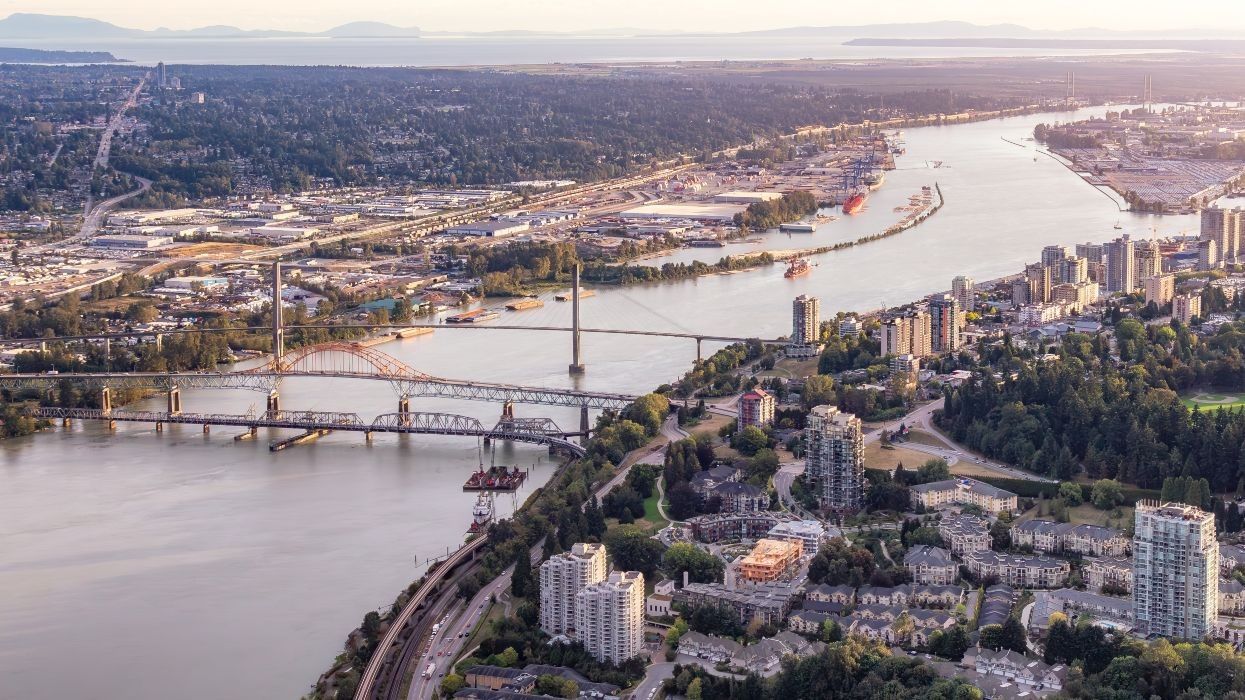Later this week, the Metro Vancouver Regional District will re-consider whether or not to go through with proposed increases to development cost charges (DCCs) after federal Minister of Housing Sean Fraser drew attention to them in late September.
The proposed changes to the DCCs, which will be considered Thursday, would more than double — and in some cases, nearly triple — the rates paid by developers when building new projects in the Metro Vancouver region. On September 26, Fraser said via a tweet that he was postponing the announcement of Housing Accelerator Fund deals with two Metro Vancouver cities, hours before he was scheduled to make the announcements.
"We're studying the impacts of this proposal and I hope to have more to say soon," Fraser wrote.
Fraser did not name the two cities, but a media advisory from earlier in the week noted an impending announcement about Burnaby and Surrey. Additionally, Fraser had already sent out letters to the mayors of both cities saying that he was approving their applications for the Housing Accelerator Fund — a $4B initiative intended to speed up the creation of 100,000 new homes across Canada.

Development Cost Charges (DCCs)
The proposed rate increases Metro Vancouver would apply to the longstanding liquid waste DCC, the water DCC implemented in April 2023, as well as a new DCC for park acquisitions, all three of which would be charged on all residential and non-residential development in the Metro Vancouver region.
Similar to DCCs charged on the municipal level, these DCCs are used to pay for new infrastructure needed for the region as it grows.
The increases would be implemented in phases across several years, with the ultimate goal of lowering the "assist factor" for each of them to 1%. Currently, the assist factor for the liquid waste DCC and water DCC are 17.5% and 50%, respectively, which means that 82.5% and 50% of the capital costs related to liquid waste and water infrastructure projects are funded through the DCC.
For the liquid waste DCC, rates range from $1,988 to $6,254 per unit depending on the type of residential unit and the sub-region they are located in, while a rate of between $1.54 to $3.30 per sq. ft is charged on non-residential developments. Following the increases, which would come into effect on January 1 in 2025, residential rates would range from $4,241 to $13,613 for residential developments and $3.08 to $6.43 for non-residential developments.
For the water DCC, the rates currently range from $4,264 to $6,692 per unit, depending on the residential unit type, and would balloon to between $12,223 and $19,714 by January 1, 2027. The rate for non-residential developments would increase from the existing $3.39 to $9.54 per sq. ft.
As the park DCC is new, there are no existing rates, but the DCC would come into effect — at an assist factor of 75% — on January 1, 2025 with rates ranging from $303 to $491 per residential unit, depending on residential type, and subsequently increase to between $1,199 to $1,943 by 2027. For non-residential development, the rate would be increased from $0.24 to $0.94 per sq. ft.
All in all, the proposed changes could result in increases of over $20K for single-detached homes and townhouses, and nearly $15K per unit for multi-family buildings.

The proposed increases are backed by the Metro Vancouver Regional District's belief of "growth paying for growth." This school of thinking believes capital costs resulting from growth should be paid by newcomers — charged to developers, who subsequently pass on the costs to consumers — and Metro Vancouver has voiced a reluctance to increase the burden on existing residents.
The Costs of Building
Although Fraser's tweet postponing the funding announcements for Burnaby and Surrey seemed to indicate that the rate increases were announced that day, the increases were proposed back in April. Since then, Metro Vancouver retained Coriolis Consulting to evaluate the proposed rate increases and also conducted several rounds of public engagement — much of it before Fraser wrote his letters to the mayors of Burnaby and Surrey on September 21.
The primary concern among the development industry is that the proposed hikes further increase the costs to build and could render some projects financially unviable. Many also point out that the increases essentially claw back the cost savings developers would get from the federal government's recent decision to eliminate the GST on new rental construction.
In a report to the Finance Committee ahead of the meeting this week, Metro Vancouver staff acknowledged the effects the increases could have on future development and the housing market at large.
"The results [of Coriolis Consulting's report] also indicated that the impacts to the housing market would be one or a combination of the following: a reduction in development site land values if the increased cost can be passed back to landowners, a reduction in profit margins for new projects, or an increase in the market price of new units or floor space."
They also note that Coriolis found that "the potential financial impacts of the proposed DCC rates to be similar to the impact from the latest 12-month change in financing rates, significantly less than the impact of the latest 12-month change in hard construction costs, and significantly less than the impact of the latest 12-month change in residential unit prices and rents."
Waivers and/or DCC reductions are currently available to non-profit housing developers, but Metro Vancouver says that they are conducting a "bylaw review to potentially extend the waiver or reduction to profit-oriented developers of affordable rental housing," which could potentially alleviate the concerns developers have.
No further details about this potential waiver have been made public, and Metro Vancouver staff are nonetheless recommending that the DCC increases be approved and granted a first, second, and third reading, which would send it to the provincial Inspector of Municipalities for approval.
It's unclear whether approval would result in Burnaby and Surrey not getting their Housing Accelerator Fund money, but Mayor of Burnaby Mike Hurley has already voiced frustration with how Fraser has handled the situation, and if that turns out to be the case, Hurley's frustration will likely not be dissipating.





















